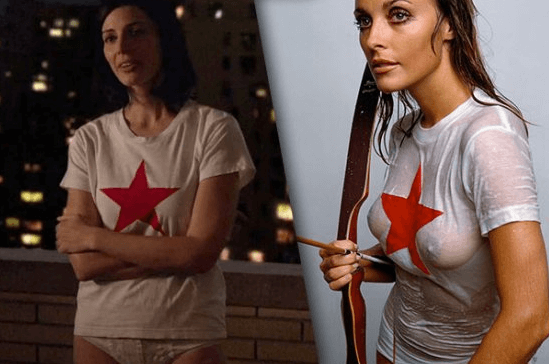Has Television’s Audience Become Too Smart? On Mad Men, True Detective, and Game of Thrones


Sometimes a shirt is just a shirt. OR IS IT?
Here are some things I remember being told when I was younger, probably after my dismayed parents grew frustrated with the many hours I spent binging on Saved by the Bell and Full House and Salute Your Shorts: TV rots your brain. Too much television will turn you into a zombie. Go read a book. The idea was that television was no substitute for reading, and that it was impossible to engage with a TV show in the same way that I could engage with a book. TV was junk food. TV was silly. TV was not good for you. But now? Times have changed.
All of that was pretty conventional wisdom for that era of television viewing, but while those adages once held true for people of all ages, now—twenty years later—screen time tends only to be discouraged for children, whereas watching certain television shows has become an imperative among the exact type of person who used to dismiss TV as being anti-intellectual. Sure, there have always been television shows which operated on a higher level than, well, Full House, but we also live in a different age of TV watching, one in which series get written about at a borderline obsessive level, conspiracy theories are floated, and costume and prop choices are pored over in the hopes of finding a clue about the future of the series’ plot line. And because of Twitter and Internet culture, all of this happens in real time! An episode usually won’t even finish airing before a million opinions get floated out into the digital ether where they get relentlessly debated in a manner indicating that viewers see these shows as more than mere entertainment, they see these shows as great art.
But are all these shows deserving of that designation? Or are we all trying to find meaning in places where it just might not exist? For many people, Sunday night has become known as a time for appointment television. It’s now the night of Game of Thrones and Mad Men, and was recently the night of Breaking Bad, Downton Abbey, Girls, and True Detective. It’s the night that launches a thousand think pieces, and millions of page views. And it is perhaps because of that parasitic relationship between the media and these shows (after all, culture writers need these shows to be important if they’re going to devote so much time and so many words to them, otherwise what is it that they’re analyzing? mere soap operas?), that the idea of these popular television series being akin to great works of literature is perpetuated.
However, it is also due to the seriousness with which these shows are perceived that a backlash became inevitable, but more than just being inevitable, it became necessary. HBO’s True Detective was almost immediately elevated upon its premiere to the status of must-watch television and talked about in reverent tones for reasons as flimsy as the fact that it was broadcast on an acclaimed network, featured A-list actors, and had… what? Interesting sets that seemed to indicate a greater depth than was evident at face value? Well, yes. True Detective is the perfect example of what happens when a television show (or any art form, really) is imbued with meaning that it doesn’t inherently possess. But what’s interesting about True Detective is that much of the meaning ascribed to it was given by its audience, which—week after week—was relentless in its quest to understand the deeper significance of the show’s smallest details, even down to the artwork hanging in a minor character’s bedroom. The intricate (some would even say convoluted) plot predictions were so well-researched and so innovative that, as True Detective progressed, it became clear that the show wouldn’t be able to live up to all the audience-conceived theories and would instead fall short—far short—from what it had the potential to be. The ultimate disappointment in the show’s conclusion (it was full of clichés, yes, but also negated the nihilistic philosophy that made the show so intriguing early on) was felt mainly by the audience, though, and not media critics, many of whom had found problems with True Detective early on, and questioned its objectification of its female characters among other problems.
But other shows are obsessed over not just by viewers at home, but also almost uniformly by critics, and chief among these is the just-returned Mad Men. Now entering its 7th season, Mad Men premiered in a time before Twitter and a time before television recaps were as ubiquitous as they are today. Perhaps because of that, it wasn’t the immediate hit that True Detective or Game of Thrones were, but it caught up to speed pretty quickly, and has long been considered the successor to such revered shows as The Wire, Deadwood, and The Sopranos (the last of which Mad Men-creator Matthew Weiner worked on). There have been some critical dissenters, notably Daniel Mendelssohn in the New York Review of Books, who wrote, “Worst of all—in a drama with aspirations to treating social and historical ‘issues’—the show is melodramatic rather than dramatic. By this I mean that it proceeds, for the most part, like a soap opera…” and more recently Marc Tracy in the New Republic, who called the show “mediocre,” saying “many of us will watch… because the melodramatic plots, flamboyant characters, and wacky costumes have kept us hooked this far. But let’s be clear: We will be watching a show whose most sociologically interesting fact is its overratedness. It’s not that ‘Mad Men’ is bad. It’s just not nearly as good as most people say it is.” But for the most part, Mad Men is beloved and entire websites are devoted to things like analyzing the costume design as it pertains to character development and plot advancement.
And then there’s the Mad Men conspiracy theories, the ones that see the parallels between Megan Draper and Sharon Tate, or assume Don Draper will die in a plane crash, or assert that Bob Benson is a time-traveling spy (no, really!). As wildly speculative as some of these are, others (particularly the one about Megan Draper/Sharon Tate) seem to be the product of an intelligent hive mind of viewers who really care about the show and enjoy picking up on all the hints dropped by Weiner in each episode. (Some would say Weiner’s “hints” are more like “anvils,” because really, Matthew Weiner? Don Draper is reading Dante’s Inferno? That’s about as subtle as a jackhammer. Anyway.) But here’s the rub! Again and again, Weiner has rejected the idea that these theories are valid and has even gone so far as to specifically deny the Megan Draper/Sharon Tate analogy, saying that it was mere coincidence that Megan wore the same shirt as Sharon Tate, not purposeful, and thus no further significance should be interpreted, a statement made all the more surprising by Megan’s story in last night’s episode, in which she lives alone in a secluded house in what could easily be the same Benedict Canyon area that Tate lived in, with coyotes ominously howling in the distance. Unless Weiner is lying (which is, of course, possible) it seems to indicate that—not unlike with True Detective—the audience’s understanding of this TV show and the implications of many of the choices made within it has actually surpassed that of its creator. This seems especially true in the case of Mad Men because Weiner uses an incredibly heavy hand when it comes to symbolism (see: literally any song choice, and the almost Forrest Gump-ian tendencies the characters have to be in the right place at the right time) and tends to talk about the show in the kind of broad strokes that would get any good television critic laughed off the face of the Internet.
Perhaps the disappointment with shows like Mad Men and True Detective is directly proportional to how high our hopes are for them to display a level of artistry that we’ve come to expect from the best television shows. In contrast, Game of Thrones tends to be embraced in a more whole-hearted way, and this is in no small part due to its lack of nuance and the blatancy of the themes with which it engages. On Game of Thrones, it’s the plot that’s important and for a show that parades (like, literally parades) its in-your-face symbolism for the viewers, there is very little in that symbolism that is open to interpretation, which would seem to be a quality that would diminish the show’s standing in the eyes of many intelligent viewers, but instead only seems to elevate it. In fact, it is Game of Thrones‘ obviousness that makes it such an excellent show. It employs the archetypal themes of love, sex, loyalty, betrayal, honor and death, but it does so in an unapologetic way that allows the viewer to enjoy the narrative rather than constantly look for hidden clues or secrets to unlock. In fact, there are secrets in Game of Thrones, and theories about the plot’s future abound on the Internet, but (and this might well have to do with the fact that this is fantasy, not reality-based) there is much more of a sense that the show will be able to pull off all its twists and turns in a way that Mad Men does not seem able to do. Which, who knows? Game of Thrones might well turn out to be as big of a disappointment as True Detective or, let’s say, Lost, but at least it doesn’t seem like it will be guilty of misdirection or a failure to follow through on minor plot lines in the way of Mad Men. (In fact, GoT might be too guilty of following through on minor plot lines that nobody cares about, see: Dorne.)
Despite the fact that we live in what is called the Golden Age of Television, it can feel like something has been lost, and that it was almost more fun to watch TV when every little detail of a character wasn’t analyzed to death. In saying that, I don’t mean that ultimately mediocre shows like True Detective or even Mad Men would be better appreciated or easier to enjoy if they weren’t obsessed over and were instead allowed to succeed or fail on their own merits. On the contrary, I think that our intensely critical, fast-paced culture is actually quicker to latch onto shows that are more style than substance now, because style is immediately apparent, while substance might take some time fully reveal itself. In fact, I think that just a couple of decades ago, it was easier to turn on the TV, formulate your own opinion, and then leave it on or turn it off as you saw fit. Television’s audience has become much smarter, and savant-like in its ability to pick up on every single detail in a show, but most television hasn’t been able to keep up with the audience, which is why so many of the shows that quickly achieve great stature don’t deserve it. But still we keep watching, not as the zombies that our parents once warned us we’d become, rather like an inquisitive, engaged audience who wants more and more, but unfortunately winds up having to settle for less.
Follow Kristin Iversen on twitter @kmiversen
You might also like 




















